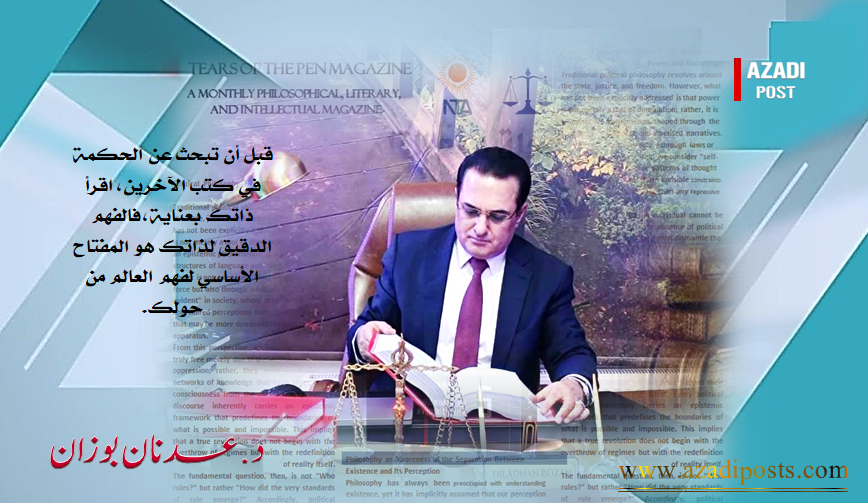Kurdistan Torn Apart: Between the Betrayal of Maps and the Silence of the World
- Super User
- مقالات سياسية
- Hits: 3687

By Dr. Adnan Bozan
In the midst of a geography drawn by rifles rather than pens, a wound was born with the name Kurdistan. The Kurds were never a people without a land; rather, it was the land that was denied recognition. Since the colonial hand extended itself to carve up the maps at the table of Sykes-Picot, the Kurdish identity has been split across four nations—finding no homeland in any of them. Geography was shattered to shatter the human being, and the Kurdish people were subjected to the harshest trial faced by any Middle Eastern nation in the 20th century: to always exist, yet without presence; to be everywhere, yet with no flag, no recognized language, no representation, and no identity in the documents of law.
The Kurds were meant to be nothing but a footnote on a page written by the victors. Since the ominous divisions of Sykes-Picot, when the spoils of the Ottoman Empire were divided without the slightest regard for the peoples inhabiting the land, Kurdish demands were deliberately ignored. The Kurdish dream of independence came to be viewed as a threat to the agendas of the states that had swallowed Kurdistan. From that point on, the Kurds embarked on a long path of uncompromising struggle—not merely for borders, but for dignity; for a language that was meant to be erased; for the mother who gave birth to martyr after martyr; and for the childhood that matured too early, learning to count the names of its martyrs instead of learning the alphabet.
The Kurdish resistance was never for the Kurds alone. It was the resistance of humanity itself against annihilation. In mountains and valleys, in prisons and exiles, in poetry and rifles, the Kurd carved into the walls of the world: “I am here... even if you try to erase me.” This people has paid with thousands of lives—not for power, not for thrones, but for life itself. A life that is not bought, not granted, but seized from the jaws of death.
The international community, for its part, has been no better. It has maintained a complicit silence—turning a blind eye to massacres, to genocidal campaigns, to forced displacement and demographic engineering, to the criminalization of the Kurdish language and the demonization of Kurdish culture, to the assassination of intellectuals, to the bombing of villages, and to international agreements in which Kurdistan is mentioned only as a problem to be solved, not as a people with rights. Indeed, in many cases, this community has been a partner in repression—through its silence, through its tolerance of the occupation of Kurdish lands, or through its deals with authoritarian regimes that see the Kurds as an existential threat simply for demanding basic rights.
Today, more than a century after the first wound, the Kurds stand at a fateful crossroads. The issue is no longer merely one of cultural rights or local governance—it has become a matter of existential survival. In Syria, they were bombed, slaughtered, and tortured under contradictory pretexts—even as they were saving the world from the fascism of ISIS. In Turkey, the Kurdish word is pursued like a bullet, and political elites and intellectuals are imprisoned on charges of “being Kurdish.” In Iran, Kurdish resistance is reduced to mere “rebellion,” and the people are treated as a security issue. In Iraq, despite autonomous rule, political and economic blockades, internal divisions, and regional interventions continue to prevent the emergence of a stable entity.
In all of this, the Kurds continue to pay the highest price—the price of defiance for the sake of freedom; the price of standing tall rather than submitting; the price of saying “no” in a world that teaches its people only how to kneel.
But this perseverance is no longer a luxury—it has become a matter of survival. We now face a stark equation: either we live with dignity, or we all die. It is neither just nor moral for the world to remain silent after all these sacrifices. A massacre cannot be a matter of opinion. Just demands cannot be met with bullets. An entire people cannot be reduced to intelligence reports and security assessments.
It is time to say: Enough.
Enough genocide.
Enough racism.
Enough repression.
Enough silencing the voice of freedom.
The Kurds are not a burden on the region—they are its living conscience. They are the deep root of the East, the dreamers who have never sold their dream, no matter the cost.
If the world truly seeks justice, it must begin by acknowledging the Kurdish plight—not in seasonal speeches, but in concrete political decisions: in support for national rights, in breaking the silence, in opening the doors of international forums to the fighters of this people. History has taught us: no nation can possess dignity without mutual recognition, and there can be no stability without justice.
And because we believe in life, we will not surrender. Because we believe in dignity, we will not compromise it. Because we believe that every drop of Kurdish blood shed for freedom is not a mere memory—but a sacred trust.
We are not seekers of revenge. We are seekers of a homeland.
And that homeland—no matter how long it takes—will be born again.
Because within every Kurd burns a fire that will not go out, and a longing for a sky that has yet to be pierced.


